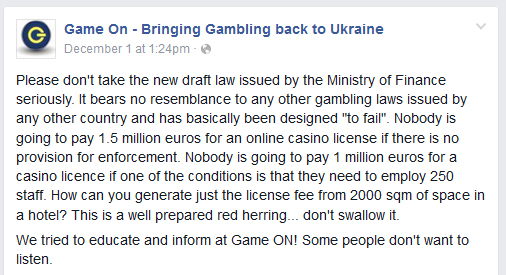The gambling business in Ukraine has been illegal since July 2009 but winds of change are blowing. The Ukrainian Ministry of Finance has put forth a draft of legislation that’s intended to legalize and regulate lottery, casinos, sports betting and online gambling but the early response from the industry has been mixed.
 There is history at play here as gambling has been barred in Ukraine since the end of July 2009 when Prime Minister Yulia Tymoshenko made news by introducing the ban. It came on the heels of the tragic fire inside a slot machine salon in Dnipropetrovsk, which took the lives of nine people.
There is history at play here as gambling has been barred in Ukraine since the end of July 2009 when Prime Minister Yulia Tymoshenko made news by introducing the ban. It came on the heels of the tragic fire inside a slot machine salon in Dnipropetrovsk, which took the lives of nine people.
One of the reasons why the topic of gaming has been reintroduced is because the country’s economy has been struggling under heavy debt and conflict with Russia and the Ministry of Finance believes that this could give it a boost.
If the bill was to be passed, a new national gambling regulatory body would be put in place to oversee the industry and report directly to the Ministry of Finance. Businesses looking to operate in the industry would have to meet certain criteria and then apply for a Ukrainian gambling license, which is where there has been some concerns from the public.
To qualify for the new gambling license in Ukraine, companies will have to be based in the country itself and must show that they have at least 2 million Euros in capital. That amount must be separate from any borrowed funds. The Ministry of Finance wants to be very comfortable with the financial health of the gaming companies because the operators will have a number of fees they’ll have to take care of on a yearly basis. That starts with an annual license fee, which ranges from 300k-1 million Euros depending on the population of the city. Cities with a population of less than 500,000 will have a fee at the lowest end (300k Euros) whereas it will cost operators one million Euros to open a casino in the capital of Kiev. Those fees don’t even include the online license, which costs another 1.5 million Euros per year. While a number of the fees seem to land within a reasonable range, the online license specifically does appear to be exorbitantly high.
“When you compare it to both Armenia and Georgia, two developed gaming markets, the 1.5 million Euro proposed in Ukraine dwarfs them by a 7 to 1 ratio,” says Storm International’s CEO Darren Keane, a company who has had their eye on entering the Ukrainian gaming space. “It does seem too high a price to pay to enter that market.”
One of the restrictions would be that only high-end hotels with more than 200 rooms will be able to operate casinos, which might make the playing field unfair.
“We do not believe that casinos should be only restricted to four and five star hotels with more than 200 rooms. That’s because there are too few hotels that would match this criteria in the Ukraine,” says Keane.
The bills comes on the heels of long conversations between government and parliament, as well as business representatives with experience in the gaming industry. While the general feeling was that the bill would be a positive step in the right direction and cover many of the points for regulation, it appears to have some weaknesses.
“The size of the operations is also something that needs to be examined,” says Keane, a savvy businessman with years of involvement in the industry. “Limiting casinos only to hotels will first limit the maximum amount of tables and slots possible. The ripple effect is that this will in turn limit the amount of taxes payable on both areas and will give less space for casino restaurants, relaxation areas and concert facilities. Other issues will arise due to space and conformity of working within the given hotels. We’re looking at things like car parking, independent kitchens and bars. Without additional services, it will also be difficult to reach the 250 minimum requirement of staff.”
Irina Sergienko, general director of Ukrainian Bookmakers Development Union thinks that high license fees and high proposed tax on gross gaming revenue at the same time will reduce the playing field only to the biggest operators with big pockets and therefore will limit the true competitive marketplace.
Much harsher criticism appeared on Game On Facebook page which recently organized gaming conference in Kiev.

The idea is to create a safe, regulated environment which can be taxed in a contrary to a current situation where illegal gambling operations are being criminalized and involve police, detention, lawyers and spending a lot of time in courts which drains the public coffers instead of replenishing them.
The hope is that with proper gambling regulation in place, the gaming business helps the country’s economy get back on its feet.